外研版(2019)必修 第一册Unit 2 Exploring English Starting out & Understanding ideas课件(共34张PPT)
文档属性
| 名称 | 外研版(2019)必修 第一册Unit 2 Exploring English Starting out & Understanding ideas课件(共34张PPT) |  | |
| 格式 | pptx | ||
| 文件大小 | 6.3MB | ||
| 资源类型 | 教案 | ||
| 版本资源 | 外研版(2019) | ||
| 科目 | 英语 | ||
| 更新时间 | 2023-10-23 22:08:47 | ||
图片预览


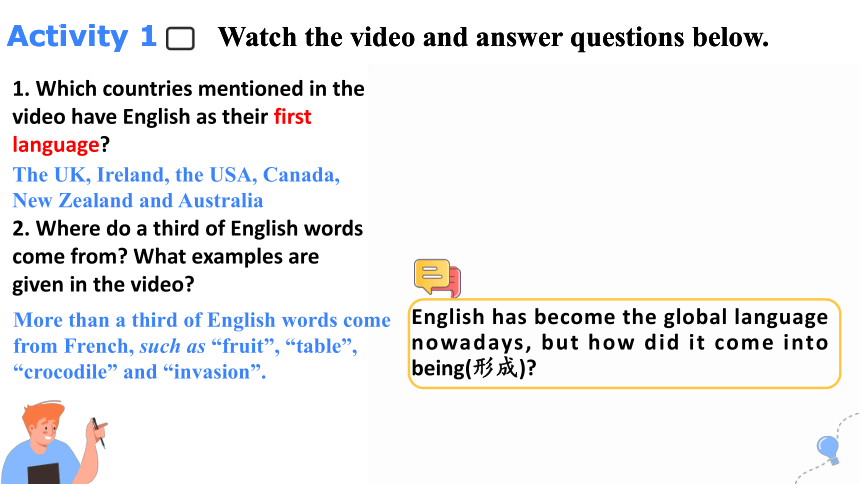
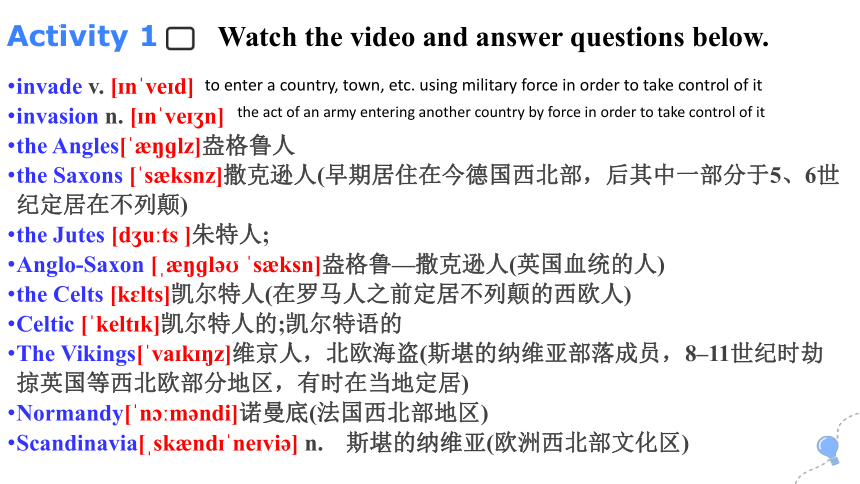
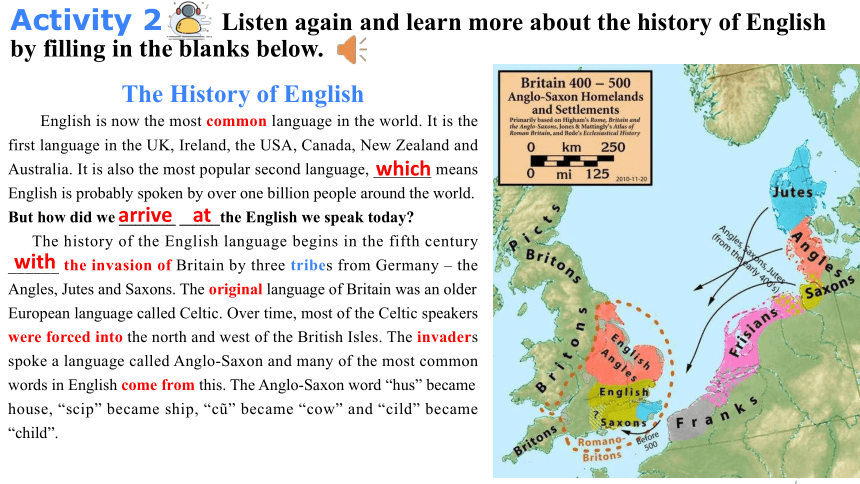
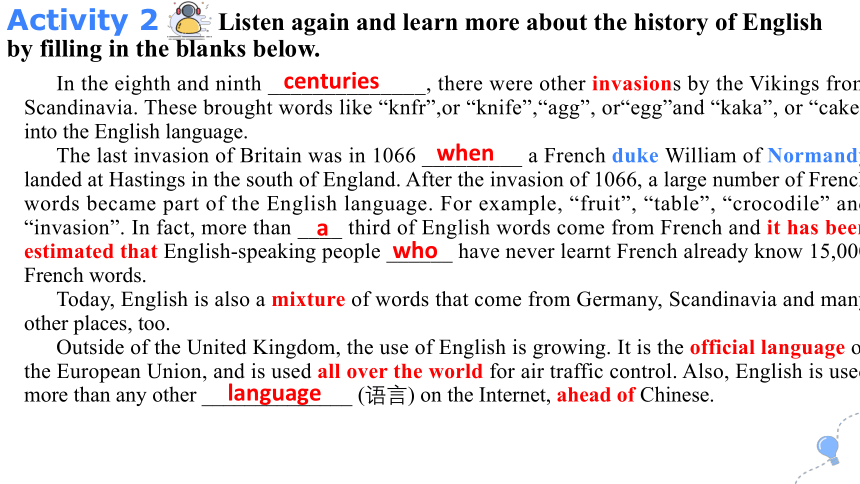
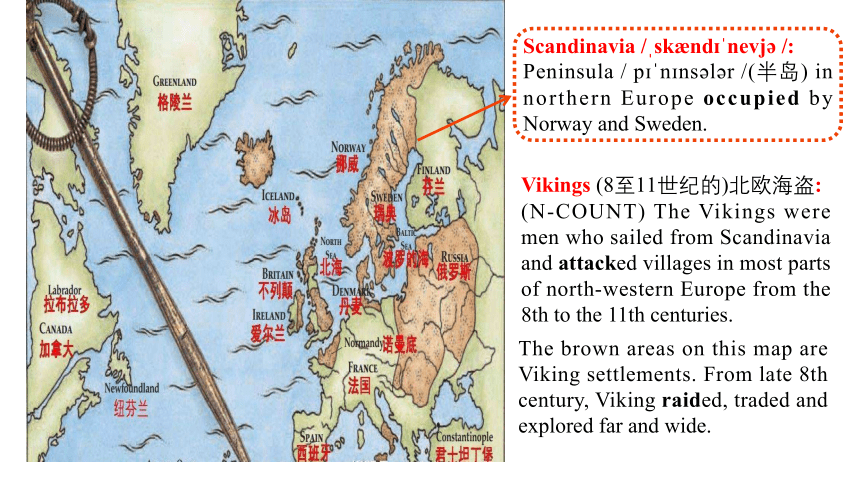

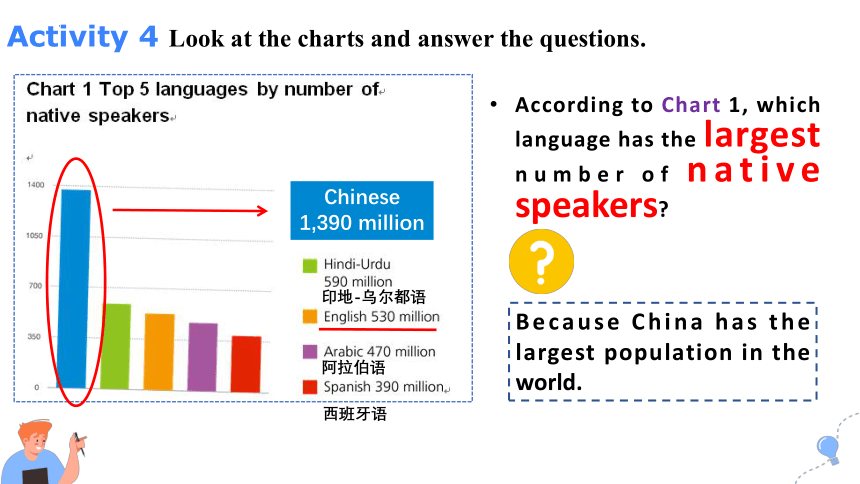
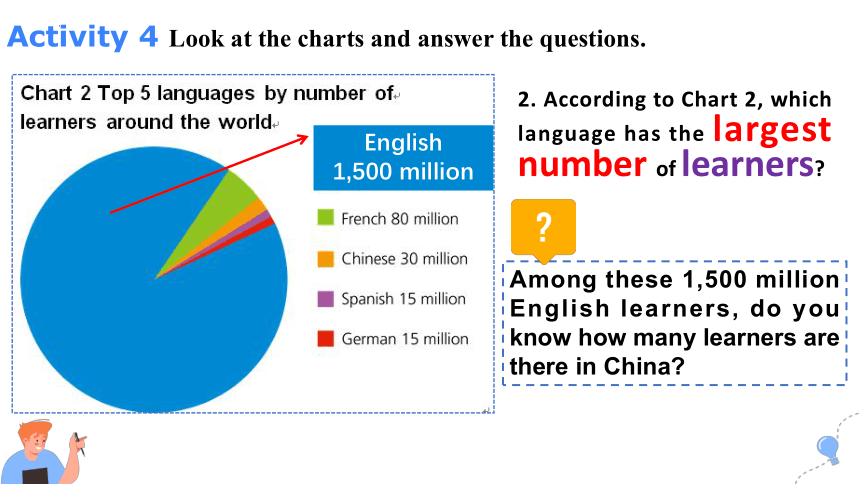
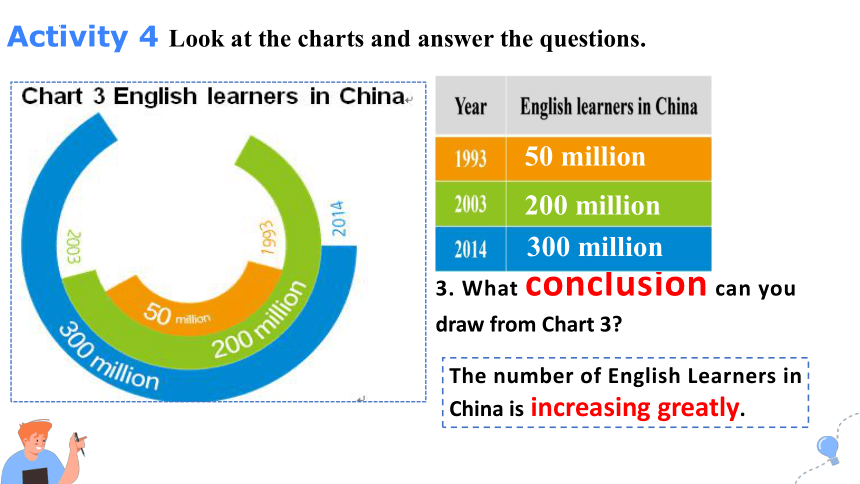
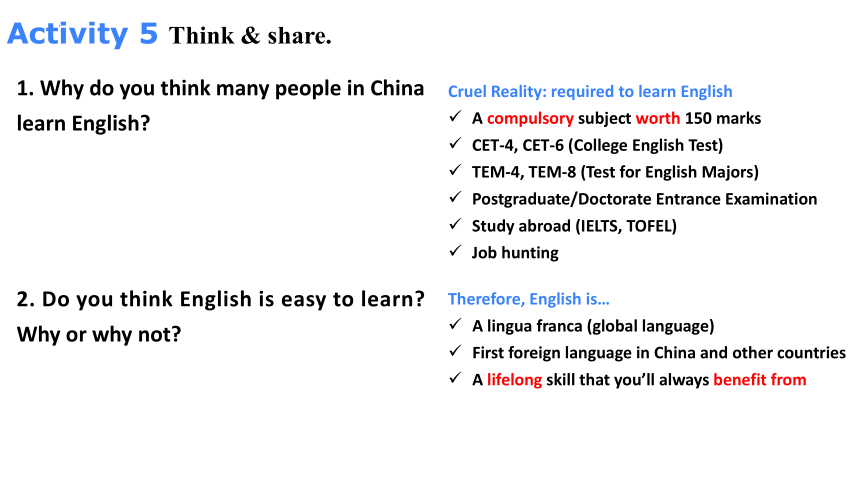
文档简介
(共34张PPT)
Unit 2 Exploring English
Starting out & Understanding ideas
Starting out
Activity 1 Watch the video and answer questions below.
1. Which countries mentioned in the video have English as their first language
2. Where do a third of English words come from What examples are given in the video
The UK, Ireland, the USA, Canada,
New Zealand and Australia
More than a third of English words come from French, such as “fruit”, “table”, “crocodile” and “invasion”.
English has become the global language nowadays, but how did it come into being(形成)
Activity 1 Watch the video and answer questions below.
Activity 1 Watch the video and answer questions below.
invade v. [ n ve d]
invasion n. [ n ve n]
the Angles[ ɡlz]盎格鲁人
the Saxons [ s ksnz]撒克逊人(早期居住在今德国西北部,后其中一部分于5、6世纪定居在不列颠)
the Jutes [d u ts ]朱特人;
Anglo-Saxon [ ɡl s ksn]盎格鲁—撒克逊人(英国血统的人)
the Celts [k lts]凯尔特人(在罗马人之前定居不列颠的西欧人)
Celtic [ kelt k]凯尔特人的;凯尔特语的
The Vikings[ va k z]维京人,北欧海盗(斯堪的纳维亚部落成员,8–11世纪时劫掠英国等西北欧部分地区,有时在当地定居)
Normandy[ n m ndi]诺曼底(法国西北部地区)
Scandinavia[ sk nd ne vi ] n. 斯堪的纳维亚(欧洲西北部文化区)
to enter a country, town, etc. using military force in order to take control of it
the act of an army entering another country by force in order to take control of it
Activity 2 Listen again and learn more about the history of English by filling in the blanks below.
The History of English
English is now the most common language in the world. It is the first language in the UK, Ireland, the USA, Canada, New Zealand and Australia. It is also the most popular second language, _______ means English is probably spoken by over one billion people around the world. But how did we _______ _____the English we speak today
The history of the English language begins in the fifth century ______ the invasion of Britain by three tribes from Germany – the Angles, Jutes and Saxons. The original language of Britain was an older European language called Celtic. Over time, most of the Celtic speakers were forced into the north and west of the British Isles. The invaders spoke a language called Anglo-Saxon and many of the most common words in English come from this. The Anglo-Saxon word “hus” became house, “scip” became ship, “c ” became “cow” and “cild” became “child”.
which
arrive at
with
Activity 2 Listen again and learn more about the history of English by filling in the blanks below.
In the eighth and ninth ______________, there were other invasions by the Vikings from Scandinavia. These brought words like “knfr”,or “knife”,“agg”, or“egg”and “kaka”, or “cake” into the English language.
The last invasion of Britain was in 1066 _________ a French duke William of Normandy landed at Hastings in the south of England. After the invasion of 1066, a large number of French words became part of the English language. For example, “fruit”, “table”, “crocodile” and “invasion”. In fact, more than ____ third of English words come from French and it has been estimated that English-speaking people ______ have never learnt French already know 15,000 French words.
Today, English is also a mixture of words that come from Germany, Scandinavia and many other places, too.
Outside of the United Kingdom, the use of English is growing. It is the official language of the European Union, and is used all over the world for air traffic control. Also, English is used more than any other ______________ (语言) on the Internet, ahead of Chinese.
when
a
who
language
centuries
Scandinavia / sk nd nevj /:
Peninsula / p n ns l r /(半岛) in northern Europe occupied by Norway and Sweden.
Vikings (8至11世纪的)北欧海盗:
(N-COUNT) The Vikings were men who sailed from Scandinavia and attacked villages in most parts of north-western Europe from the 8th to the 11th centuries.
The brown areas on this map are Viking settlements. From late 8th century, Viking raided, traded and explored far and wide.
1066
After the landing of a _______duke, William of Normandy, the language mixed with French.
8th & 9th centuries
After the invasion by____, the language mixed with language from Scandinavia
5th century
After the invasion by three tribes from ______,the language mixed with _________.
Activity 3 Figure out the evolution of English.
What is English we speak today
What’s the original language of Britain
How did we arrive at the English we speak today
The original language of Britain:_____.
English is also a mixture of words that come from Germany, Scandinavia and ___________, too.
The evolution of English
Celtic
Germany
Anglo-Saxon
Vikings
French
Today
many other places
/ ev lu ( )n /
Activity 4 Look at the charts and answer the questions.
According to Chart 1, which language has the largest number of native speakers
Chinese 1,390 million
Because China has the largest population in the world.
印地-乌尔都语
阿拉伯语
西班牙语
Activity 4 Look at the charts and answer the questions.
2. According to Chart 2, which language has the largest number of learners
English
1,500 million
Among these 1,500 million English learners, do you know how many learners are there in China
Activity 4 Look at the charts and answer the questions.
3. What conclusion can you draw from Chart 3
50 million
200 million
300 million
The number of English Learners in China is increasing greatly.
Activity 5 Think & share.
1. Why do you think many people in China learn English
2. Do you think English is easy to learn Why or why not
Cruel Reality: required to learn English
A compulsory subject worth 150 marks
CET-4, CET-6 (College English Test)
TEM-4, TEM-8 (Test for English Majors)
Postgraduate/Doctorate Entrance Examination
Study abroad (IELTS, TOFEL)
Job hunting
Therefore, English is…
A lingua franca (global language)
First foreign language in China and other countries
A lifelong skill that you’ll always benefit from
Neither Pine nor Apple in Pineapple
Understanding ideas
CLASS 01
Pre-reading
Chinese is an interesting ,creative and complex language.
鱼香肉丝
老婆饼
夫妻肺片
麻婆豆腐
Some interesting facts in English
English is as interesting ,creative and complex as Chinese.
hamburger
no egg in eggplant
no ham in ____________
neither pine nor apple in __________
hamburger
pineapple
eggplant
pine + apple =pineapple
Activity 1
Look at the title of the passage and the pictures. Tick what you think the passage is about
Activity 2 Page16
Choose the author's purpose in writing the passage.
1 To tell us that English is very difficult to learn.
2 To give advice on how to learn English.
3 To show that English is interesting and creative.
4 To explain how English was created.
Activity 3
Read the passage quickly and silently and then match the main idea with each part.
Part1.(Para1) A. Examples of some
confusing expressions.
Part2.(Para2-6) B. The reason why English is
so crazy.
Part3.(Para7) C. English is a crazy language
to learn.
Tips for reading:
Pay attention to the first sentence of each paragraph.
Activity 4
no egg in eggplant
no ham in 2____________
neither pine nor apple in 3_____________
sculpt a sculpture
paint a(n) 4________
BUT take a photo
hamburger
pineapple
painting
Activity 4
In order to support his idea, the author uses many examples that show the 1_____________ madness of English.
unique
Activity 4
seasick --- sick at sea
5________--- sick in the air
6 ________--- sick in a car
BUT 7__________--- sick at home
airsick
carsick
homesick
Activity 4
“Hard” is the opposite of “soft”
“ Hardly” and “softly are not a(n) 8____________ pair.
“Harmless” is the opposite of “ harmful”.
Shameful and shameless 9___________ are the same.
burn up--- burn down
fill in a form---10___________ a form
Stars are out.---They are visible.
Lights are out.--- They are 11______________.
opposing
behaviors
fill out
invisible
Activity 4
I wind up my watch.---It starts.
I wind up the passage---It 12______
The reason is that English was invented by people, and it 13___________ the creativity of the human race.
ends
reflects
Summarize
Activity 5
Read the following information and answer the questions.
The word “pineapple” developed from the Spanish word “pina”, which means pine cone when it came to England, “ apple” was added to show it is a kind of fruit.
The origin of “hamburger” was a hard beef steak called “ Hamburg steak” , eaten without bread. Later, people reinvented it and called it “hamburger”.
Eggplants used to be smaller and yellow or white. They looked a bit like eggs, which led to the name “eggplant”.
How did pineapples, hamburgers and eggplants get their names
Think and share
What do you find most challenging about learning English
How do you deal with this
Review
Have you ever asked yourself why people often have trouble learning English I hadn’t, until one day my five-year-old son asked me whether there was ham in a hamburger. There isn’t. This made me realize that there's no egg in eggplant either. Neither is there pine nor apple in pineapple. This got me thinking how English can be a crazy language to learn.
For example, in our free time we can sculpt a sculpture and paint a painting, but we take a photo. And when we are traveling we say that we are in the car or the taxi, but on the train or bus! While we're doing all this traveling, we can get seasick at sea, airsick in the air and carsick in a car, but we don’t get homesick when we get back home. And speaking of home why aren't homework and housework the same thing
If “hard” is the opposite of “soft”, why are “hardly” and “softly" not an opposing pair If harmless actions are the opposite of harmful actions, why are shameless and shameful behaviors the same
When we look out of the window and see rain or snow, we can say “it's raining“ or “it’s snowing". But when we see sunshine. we can't say “it's sunshining”
Even the smallest words can be confusing. When you see the capitalized “WHO” in an medical report, do you read it as the “who” in “Who's that ” What about “IT” and “US”
You also have to wonder at the unique madness of a language in which a house can burn up as it burns down, in which you fill in a form by filling it out, and in which an alarm is only heard once it goes off!
English was invented by people, not computers, and it reflects the creativity of the human race. That is why when the stars are out, they are visible, but when the lights are out, they are invisible. And that is why when I wind up my watch, it starts, but when I wind up this passage, it ends.
Unit 2 Exploring English
Starting out & Understanding ideas
Starting out
Activity 1 Watch the video and answer questions below.
1. Which countries mentioned in the video have English as their first language
2. Where do a third of English words come from What examples are given in the video
The UK, Ireland, the USA, Canada,
New Zealand and Australia
More than a third of English words come from French, such as “fruit”, “table”, “crocodile” and “invasion”.
English has become the global language nowadays, but how did it come into being(形成)
Activity 1 Watch the video and answer questions below.
Activity 1 Watch the video and answer questions below.
invade v. [ n ve d]
invasion n. [ n ve n]
the Angles[ ɡlz]盎格鲁人
the Saxons [ s ksnz]撒克逊人(早期居住在今德国西北部,后其中一部分于5、6世纪定居在不列颠)
the Jutes [d u ts ]朱特人;
Anglo-Saxon [ ɡl s ksn]盎格鲁—撒克逊人(英国血统的人)
the Celts [k lts]凯尔特人(在罗马人之前定居不列颠的西欧人)
Celtic [ kelt k]凯尔特人的;凯尔特语的
The Vikings[ va k z]维京人,北欧海盗(斯堪的纳维亚部落成员,8–11世纪时劫掠英国等西北欧部分地区,有时在当地定居)
Normandy[ n m ndi]诺曼底(法国西北部地区)
Scandinavia[ sk nd ne vi ] n. 斯堪的纳维亚(欧洲西北部文化区)
to enter a country, town, etc. using military force in order to take control of it
the act of an army entering another country by force in order to take control of it
Activity 2 Listen again and learn more about the history of English by filling in the blanks below.
The History of English
English is now the most common language in the world. It is the first language in the UK, Ireland, the USA, Canada, New Zealand and Australia. It is also the most popular second language, _______ means English is probably spoken by over one billion people around the world. But how did we _______ _____the English we speak today
The history of the English language begins in the fifth century ______ the invasion of Britain by three tribes from Germany – the Angles, Jutes and Saxons. The original language of Britain was an older European language called Celtic. Over time, most of the Celtic speakers were forced into the north and west of the British Isles. The invaders spoke a language called Anglo-Saxon and many of the most common words in English come from this. The Anglo-Saxon word “hus” became house, “scip” became ship, “c ” became “cow” and “cild” became “child”.
which
arrive at
with
Activity 2 Listen again and learn more about the history of English by filling in the blanks below.
In the eighth and ninth ______________, there were other invasions by the Vikings from Scandinavia. These brought words like “knfr”,or “knife”,“agg”, or“egg”and “kaka”, or “cake” into the English language.
The last invasion of Britain was in 1066 _________ a French duke William of Normandy landed at Hastings in the south of England. After the invasion of 1066, a large number of French words became part of the English language. For example, “fruit”, “table”, “crocodile” and “invasion”. In fact, more than ____ third of English words come from French and it has been estimated that English-speaking people ______ have never learnt French already know 15,000 French words.
Today, English is also a mixture of words that come from Germany, Scandinavia and many other places, too.
Outside of the United Kingdom, the use of English is growing. It is the official language of the European Union, and is used all over the world for air traffic control. Also, English is used more than any other ______________ (语言) on the Internet, ahead of Chinese.
when
a
who
language
centuries
Scandinavia / sk nd nevj /:
Peninsula / p n ns l r /(半岛) in northern Europe occupied by Norway and Sweden.
Vikings (8至11世纪的)北欧海盗:
(N-COUNT) The Vikings were men who sailed from Scandinavia and attacked villages in most parts of north-western Europe from the 8th to the 11th centuries.
The brown areas on this map are Viking settlements. From late 8th century, Viking raided, traded and explored far and wide.
1066
After the landing of a _______duke, William of Normandy, the language mixed with French.
8th & 9th centuries
After the invasion by____, the language mixed with language from Scandinavia
5th century
After the invasion by three tribes from ______,the language mixed with _________.
Activity 3 Figure out the evolution of English.
What is English we speak today
What’s the original language of Britain
How did we arrive at the English we speak today
The original language of Britain:_____.
English is also a mixture of words that come from Germany, Scandinavia and ___________, too.
The evolution of English
Celtic
Germany
Anglo-Saxon
Vikings
French
Today
many other places
/ ev lu ( )n /
Activity 4 Look at the charts and answer the questions.
According to Chart 1, which language has the largest number of native speakers
Chinese 1,390 million
Because China has the largest population in the world.
印地-乌尔都语
阿拉伯语
西班牙语
Activity 4 Look at the charts and answer the questions.
2. According to Chart 2, which language has the largest number of learners
English
1,500 million
Among these 1,500 million English learners, do you know how many learners are there in China
Activity 4 Look at the charts and answer the questions.
3. What conclusion can you draw from Chart 3
50 million
200 million
300 million
The number of English Learners in China is increasing greatly.
Activity 5 Think & share.
1. Why do you think many people in China learn English
2. Do you think English is easy to learn Why or why not
Cruel Reality: required to learn English
A compulsory subject worth 150 marks
CET-4, CET-6 (College English Test)
TEM-4, TEM-8 (Test for English Majors)
Postgraduate/Doctorate Entrance Examination
Study abroad (IELTS, TOFEL)
Job hunting
Therefore, English is…
A lingua franca (global language)
First foreign language in China and other countries
A lifelong skill that you’ll always benefit from
Neither Pine nor Apple in Pineapple
Understanding ideas
CLASS 01
Pre-reading
Chinese is an interesting ,creative and complex language.
鱼香肉丝
老婆饼
夫妻肺片
麻婆豆腐
Some interesting facts in English
English is as interesting ,creative and complex as Chinese.
hamburger
no egg in eggplant
no ham in ____________
neither pine nor apple in __________
hamburger
pineapple
eggplant
pine + apple =pineapple
Activity 1
Look at the title of the passage and the pictures. Tick what you think the passage is about
Activity 2 Page16
Choose the author's purpose in writing the passage.
1 To tell us that English is very difficult to learn.
2 To give advice on how to learn English.
3 To show that English is interesting and creative.
4 To explain how English was created.
Activity 3
Read the passage quickly and silently and then match the main idea with each part.
Part1.(Para1) A. Examples of some
confusing expressions.
Part2.(Para2-6) B. The reason why English is
so crazy.
Part3.(Para7) C. English is a crazy language
to learn.
Tips for reading:
Pay attention to the first sentence of each paragraph.
Activity 4
no egg in eggplant
no ham in 2____________
neither pine nor apple in 3_____________
sculpt a sculpture
paint a(n) 4________
BUT take a photo
hamburger
pineapple
painting
Activity 4
In order to support his idea, the author uses many examples that show the 1_____________ madness of English.
unique
Activity 4
seasick --- sick at sea
5________--- sick in the air
6 ________--- sick in a car
BUT 7__________--- sick at home
airsick
carsick
homesick
Activity 4
“Hard” is the opposite of “soft”
“ Hardly” and “softly are not a(n) 8____________ pair.
“Harmless” is the opposite of “ harmful”.
Shameful and shameless 9___________ are the same.
burn up--- burn down
fill in a form---10___________ a form
Stars are out.---They are visible.
Lights are out.--- They are 11______________.
opposing
behaviors
fill out
invisible
Activity 4
I wind up my watch.---It starts.
I wind up the passage---It 12______
The reason is that English was invented by people, and it 13___________ the creativity of the human race.
ends
reflects
Summarize
Activity 5
Read the following information and answer the questions.
The word “pineapple” developed from the Spanish word “pina”, which means pine cone when it came to England, “ apple” was added to show it is a kind of fruit.
The origin of “hamburger” was a hard beef steak called “ Hamburg steak” , eaten without bread. Later, people reinvented it and called it “hamburger”.
Eggplants used to be smaller and yellow or white. They looked a bit like eggs, which led to the name “eggplant”.
How did pineapples, hamburgers and eggplants get their names
Think and share
What do you find most challenging about learning English
How do you deal with this
Review
Have you ever asked yourself why people often have trouble learning English I hadn’t, until one day my five-year-old son asked me whether there was ham in a hamburger. There isn’t. This made me realize that there's no egg in eggplant either. Neither is there pine nor apple in pineapple. This got me thinking how English can be a crazy language to learn.
For example, in our free time we can sculpt a sculpture and paint a painting, but we take a photo. And when we are traveling we say that we are in the car or the taxi, but on the train or bus! While we're doing all this traveling, we can get seasick at sea, airsick in the air and carsick in a car, but we don’t get homesick when we get back home. And speaking of home why aren't homework and housework the same thing
If “hard” is the opposite of “soft”, why are “hardly” and “softly" not an opposing pair If harmless actions are the opposite of harmful actions, why are shameless and shameful behaviors the same
When we look out of the window and see rain or snow, we can say “it's raining“ or “it’s snowing". But when we see sunshine. we can't say “it's sunshining”
Even the smallest words can be confusing. When you see the capitalized “WHO” in an medical report, do you read it as the “who” in “Who's that ” What about “IT” and “US”
You also have to wonder at the unique madness of a language in which a house can burn up as it burns down, in which you fill in a form by filling it out, and in which an alarm is only heard once it goes off!
English was invented by people, not computers, and it reflects the creativity of the human race. That is why when the stars are out, they are visible, but when the lights are out, they are invisible. And that is why when I wind up my watch, it starts, but when I wind up this passage, it ends.
